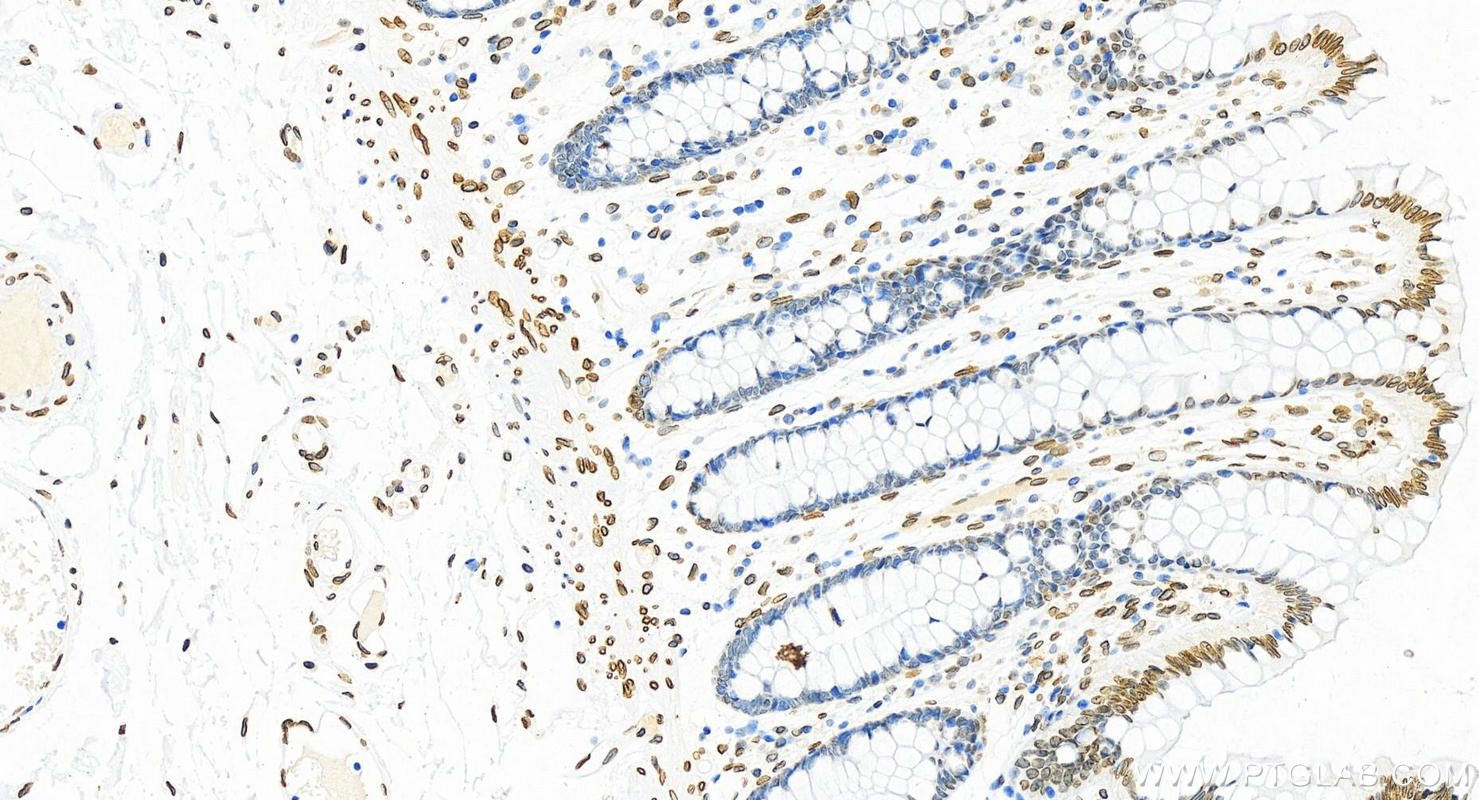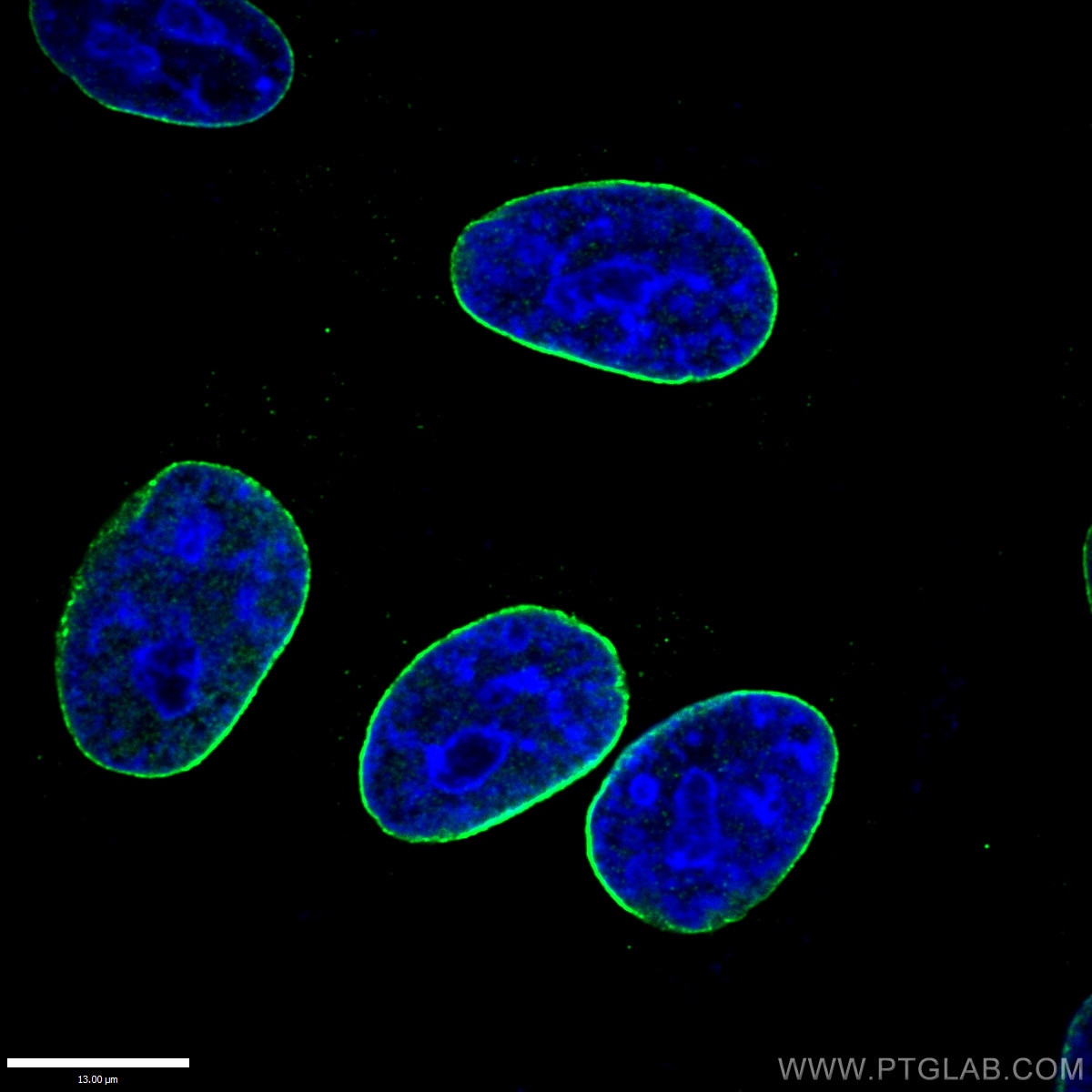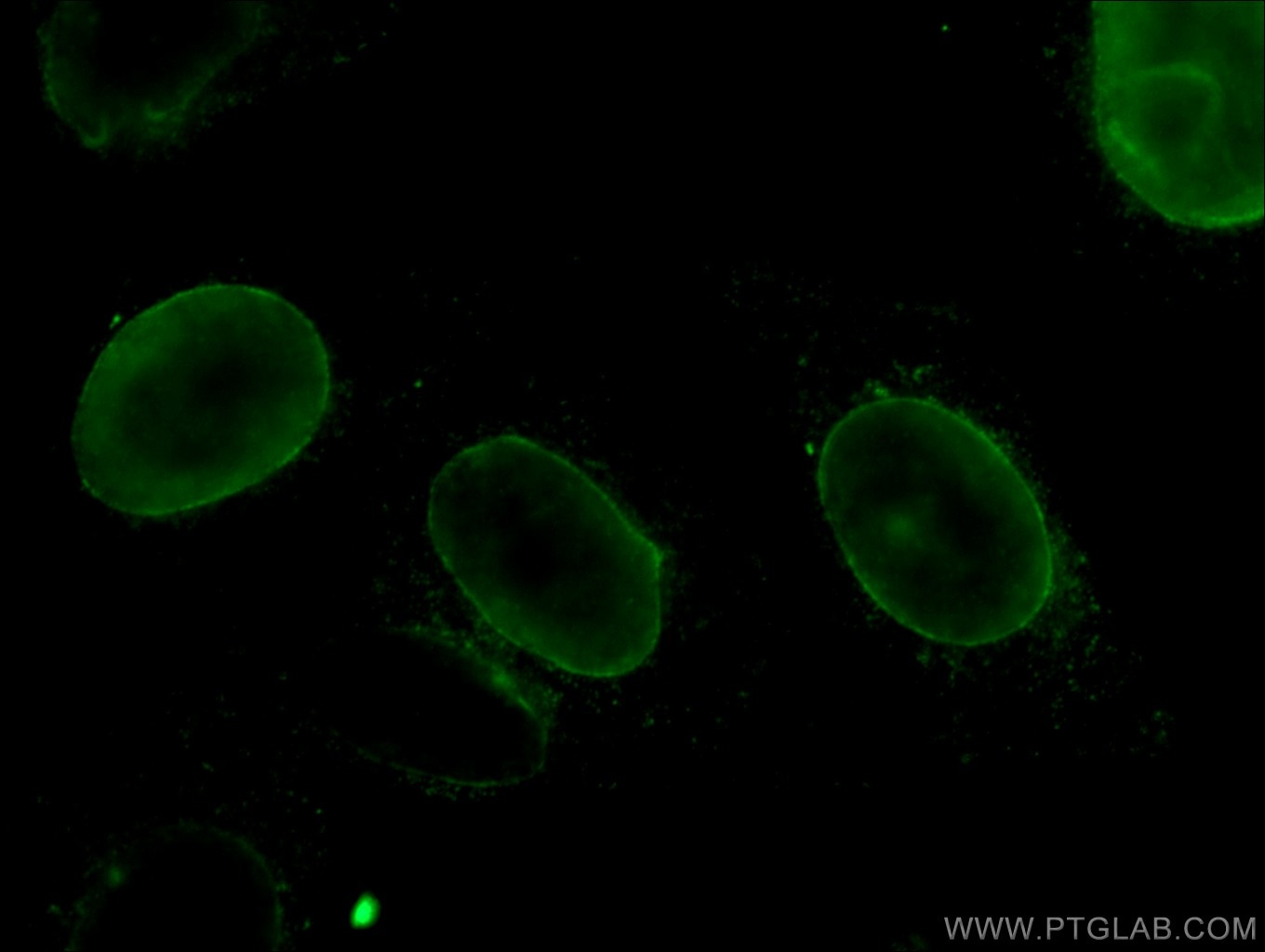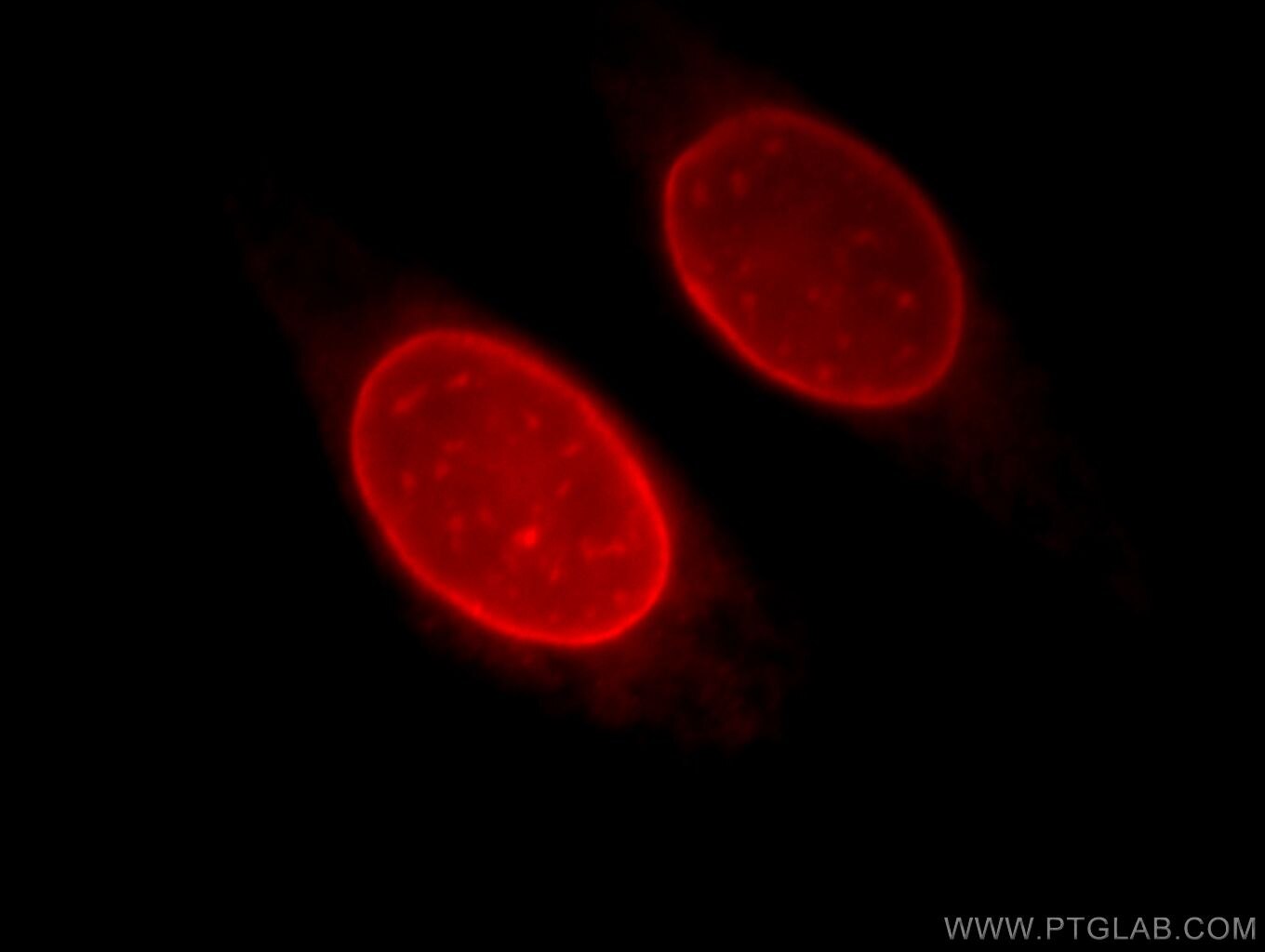- Featured Product
- KD/KO Validated
Lamin A/C Polyclonal antibody
Lamin A/C Polyclonal Antibody for WB, IHC, IF/ICC, FC (Intra), IP, ELISA
Host / Isotype
Rabbit / IgG
Reactivity
human, mouse, rat and More (2)
Applications
WB, IHC, IF/ICC, FC (Intra), IP, ELISA
Conjugate
Unconjugated
241
Cat no : 10298-1-AP
Synonyms
"Lamin A/C Antibodies" Comparison
View side-by-side comparison of Lamin A/C antibodies from other vendors to find the one that best suits your research needs.
Tested Applications
| Positive WB detected in | A431 cells, HEK-293 cells, HUVEC cells, mouse ovary tissue, SKOV-3 cells, HeLa cells, A375 cells, C6 cells, NIH/3T3 cells |
| Positive IP detected in | HeLa cells, A375 cells |
| Positive IHC detected in | mouse heart tissue, human normal colon Note: suggested antigen retrieval with TE buffer pH 9.0; (*) Alternatively, antigen retrieval may be performed with citrate buffer pH 6.0 |
| Positive IF/ICC detected in | HepG2 cells, HeLa cells |
| Positive FC (Intra) detected in | HEK-293T cells |
Recommended dilution
| Application | Dilution |
|---|---|
| Western Blot (WB) | WB : 1:5000-1:50000 |
| Immunoprecipitation (IP) | IP : 0.5-4.0 ug for 1.0-3.0 mg of total protein lysate |
| Immunohistochemistry (IHC) | IHC : 1:2000-1:8000 |
| Immunofluorescence (IF)/ICC | IF/ICC : 1:400-1:1600 |
| Flow Cytometry (FC) (INTRA) | FC (INTRA) : 0.40 ug per 10^6 cells in a 100 µl suspension |
| It is recommended that this reagent should be titrated in each testing system to obtain optimal results. | |
| Sample-dependent, Check data in validation data gallery. | |
Published Applications
| KD/KO | See 4 publications below |
| WB | See 224 publications below |
| IHC | See 1 publications below |
| IF | See 14 publications below |
| IP | See 4 publications below |
Product Information
10298-1-AP targets Lamin A/C in WB, IHC, IF/ICC, FC (Intra), IP, ELISA applications and shows reactivity with human, mouse, rat samples.
| Tested Reactivity | human, mouse, rat |
| Cited Reactivity | human, mouse, rat, monkey, duck |
| Host / Isotype | Rabbit / IgG |
| Class | Polyclonal |
| Type | Antibody |
| Immunogen | Lamin A/C fusion protein Ag0408 |
| Full Name | lamin A/C |
| Calculated Molecular Weight | 65 kDa |
| Observed Molecular Weight | 65 kDa, 70 kDa |
| GenBank Accession Number | BC003162 |
| Gene Symbol | Lamin A/C |
| Gene ID (NCBI) | 4000 |
| RRID | AB_2296961 |
| Conjugate | Unconjugated |
| Form | Liquid |
| Purification Method | Antigen affinity purification |
| Storage Buffer | PBS with 0.02% sodium azide and 50% glycerol pH 7.3. |
| Storage Conditions | Store at -20°C. Stable for one year after shipment. Aliquoting is unnecessary for -20oC storage. 20ul sizes contain 0.1% BSA. |
Background Information
Lamin A/C is also named as LMNA or LMN1. The lamin family of proteins make up the matrix and are highly conserved in evolution. During mitosis, the lamina matrix is reversibly disassembled as the lamin proteins are phosphorylated. Lamin proteins are thought to be involved in nuclear stability, chromatin structure, and gene expression. The lack of lamin A/C can be as a novel marker for undifferentiated embryonic stem cells and lamin A/C expression is an early indicator of differentiation (PMID: 16179429). Mutations in this gene lead to several diseases: Emery-Dreifuss muscular dystrophy, familial partial lipodystrophy, limb-girdle muscular dystrophy, dilated cardiomyopathy, Charcot-Marie-Tooth disease, and Hutchinson-Gilford progeria syndrome. This protein has 4 isoforms produced by alternative splicing with the molecular weight of 74 kDa, 65 kDa, 70 kDa, and 64 kDa. This antibody can recognize 4 isoforms of Lamin A/C.
Protocols
| Product Specific Protocols | |
|---|---|
| WB protocol for Lamin A/C antibody 10298-1-AP | Download protocol |
| IHC protocol for Lamin A/C antibody 10298-1-AP | Download protocol |
| IF protocol for Lamin A/C antibody 10298-1-AP | Download protocol |
| IP protocol for Lamin A/C antibody 10298-1-AP | Download protocol |
| Standard Protocols | |
|---|---|
| Click here to view our Standard Protocols |
Publications
| Species | Application | Title |
|---|---|---|
Mol Cancer Cell surface CD55 traffics to the nucleus leading to cisplatin resistance and stemness by inducing PRC2 and H3K27 trimethylation on chromatin in ovarian cancer | ||
Nat Microbiol Nuclear pore blockade reveals that HIV-1 completes reverse transcription and uncoating in the nucleus. | ||
Mol Cell Lactylation-driven METTL3-mediated RNA m6A modification promotes immunosuppression of tumor-infiltrating myeloid cells. | ||
J Extracell Vesicles Extracellular vesicles derived from oesophageal cancer containing P4HB promote muscle wasting via regulating PHGDH/Bcl-2/caspase-3 pathway. | ||
Cancer Cell SET1A-Mediated Mono-Methylation at K342 Regulates YAP Activation by Blocking Its Nuclear Export and Promotes Tumorigenesis. | ||
Sci Adv XAF1 promotes anti-RNA virus immune responses by regulating chromatin accessibility |
Reviews
The reviews below have been submitted by verified Proteintech customers who received an incentive for providing their feedback.
FH Alejandro (Verified Customer) (08-22-2022) | Shows clear staining in IF and well staining using FACS
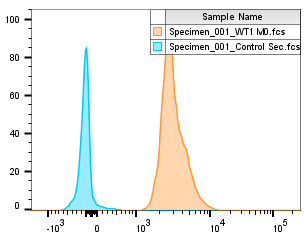 |
FH Charlotte (Verified Customer) (07-29-2022) | Cell fraction performed on NIH-3T3 cells to show the nucleus part. Blot super clean. Antibody specific. Easy to reveal.
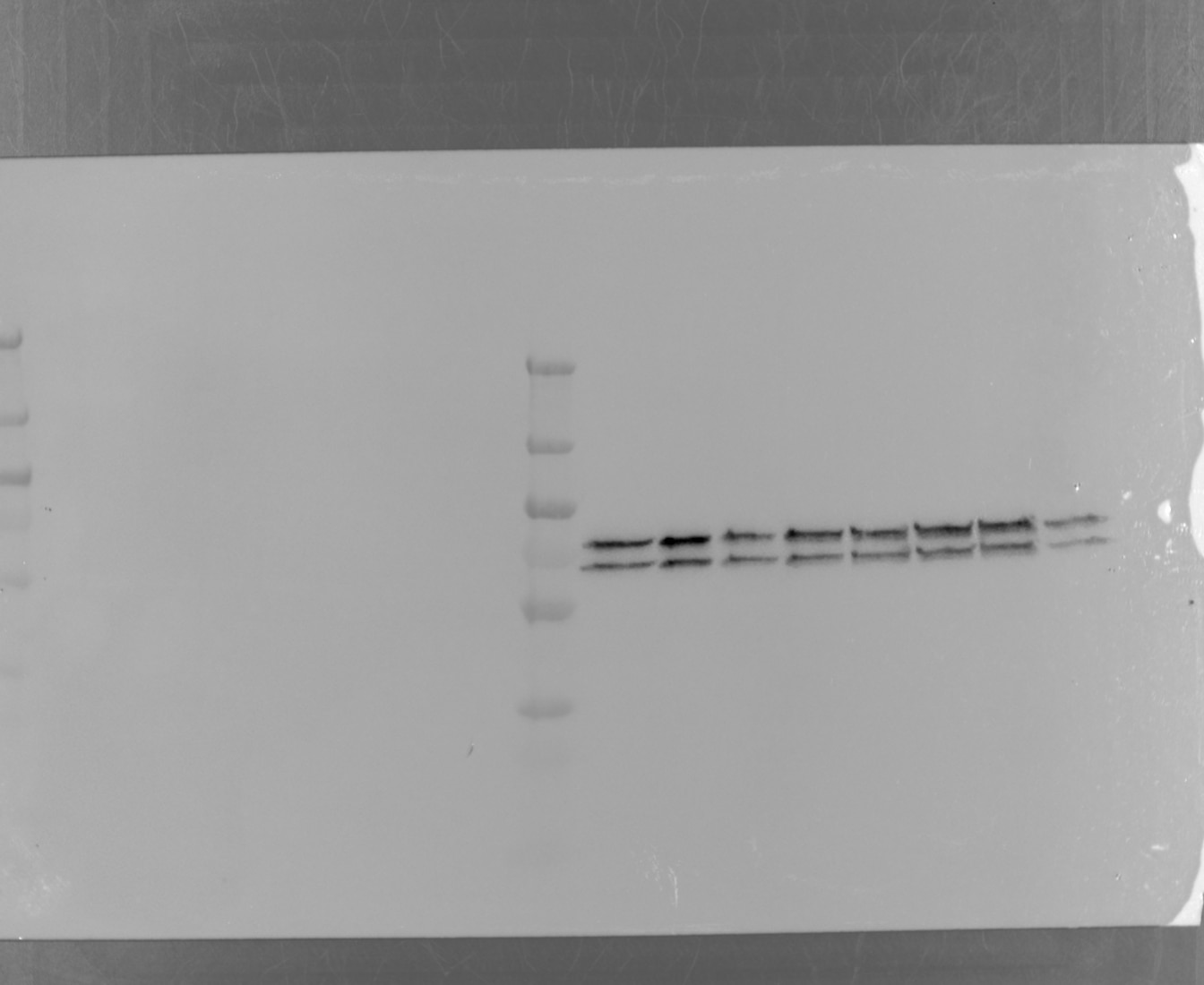 |
FH S (Verified Customer) (12-31-2021) | good antibody.
 |
FH Azita (Verified Customer) (06-16-2021) | It was used as a marker in WB to confirm proper nuclear fractionation of cell lysate.
|
FH Declan (Verified Customer) (11-29-2018) |
|










